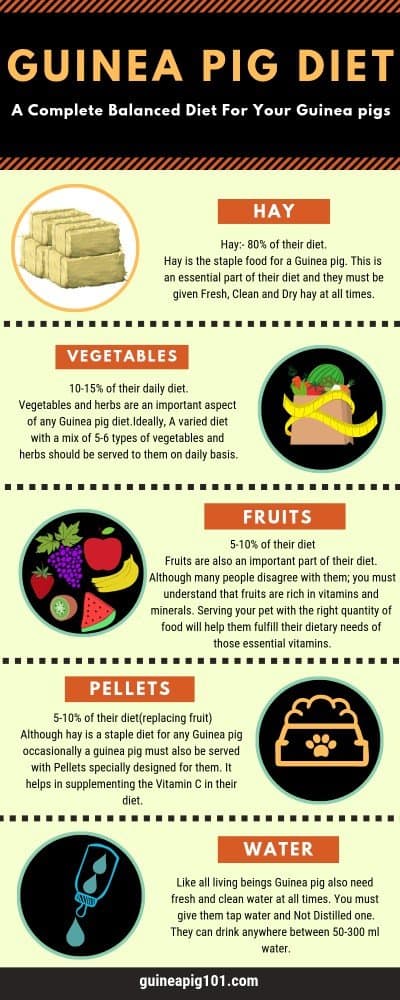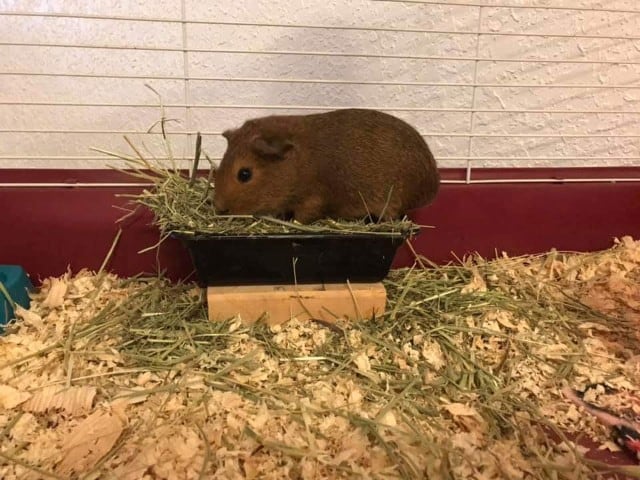So, you are planning to get a pair of guinea pigs or already have some, and you might be wondering how much hay do guinea pigs eat a day? What size of the bag should you buy, or how much will it last? Even I had all these questions in my mind when I first got my guinea pigs. And after keeping a bunch of them for several years, I think I can get you a close idea of what to expect.
Provided that your guinea pigs have FREE ACCESS to hay, an adult guinea pig can consume anywhere between 6-8 pounds(3-4 kg) of hay every month. If you have a young guinea pig, you can expect them to go through 5-6 pounds(2-3 kg) every month. There are a few factors, including the quality of hay, the health of guinea pigs, and their overall diet, which can impact the consumption of hay.
A guinea pig’s diet should consist of 80% hay in it. Hay is one of the most vital parts of their diet, and there is no substitute for the same.
If your guinea pigs don’t like vegetables, then it can be substituted by pellets or a different vegetable, but the substitution of hay is impossible in their diet.
Importance of hay in guinea pig’s diet
Hay is rich in, and fibers and guinea pigs need a lot of it to keep their digestive system on track.
Like horses, guinea pigs can’t absorb all the nutrients from their diet at once, and thus, they break down most of their food into cecum and colons.
They excrete this in the form of poop and eat it back immediately. Although it may sound a little gross to you all although it is an ingenious and effective system that works flawlessly for them.
Guinea pigs need a lot of hay in their diet as a lack of hay can develop health problems with their cecal formation. It also hinders their ability to absorb water, which in turn results in dehydration and a severe life threat for them.
Hay also contains silica that naturally wears down your guinea pig’s molar teeth.
If your guinea pigs don’t get enough hay, then they will develop dental issues, including overgrown teeth, which can be fatal in some instances.
How much hay do guinea pigs eat per day?
An adult guinea pig can eat anywhere between 90-100 grams of hay every day.
It will be a wise decision to provide fresh hay at least twice daily. You can create 1-2 piles around their cage to forage and eat.
Always make sure they have plenty of hay available in their cage at all times.
How much hay should you get?
I can totally understand how tough it can be to decide which pack of hay should you buy and how much will it last for?
So today, I have decided to share some of the most popular and best feed for your guinea pigs from premium ones to the most economical one out there.
Please note: All the data below is for a sole guinea pig, you can calculate as per your pack size keeping the below as reference:
| Recommended Hay | Pack size | Will last for? |
|---|---|---|
| Oxbow Timothy Hay | 9lb | 35-40 days |
| Small Pet Select Timothy Hay | 12lb | 45-50 days |
| Standlee Timothy Hay | 25lb | 90 days+ |
| Kaytee Timothy Hay | 12lb | 45-50 days |
Why is my guinea pig not eating hay?
There can be a lot of reasons due to which your guinea pigs might not be eating an adequate amount of hay. Let us have a look at some of the most common cause:
They don’t have easy access to hay
Many people often get tempted to use some unique style hay racks, which definitely looks great but doesn’t serve the purpose all the time.
Some of the hay racks hinder the accessibility of hay to your guinea pigs. Some hay racks like hay balls often carry a risk of getting your guinea pigs head stuck into it.
Thus, using something different might look unique but can discourage your guinea pigs from eating their food.
The hay is of poor quality
Hay is the most significant part of your guinea pig’s diet. It provides your guinea pigs with the most vital nutrients, including fiber, which they need in abundance.
Providing cheap quality thin vacuum-packed hay to your guinea pigs is not the best idea. If you care about the good health of your guinea pigs and want that they live a long life, then provide then learn a little bit about good quality hay for your guinea pigs and offer them one if you can.
There are a few things you need to check to ensure the hay is of good quality for your guinea pigs:
- Dry, first cutting hay
- Mixed texture; neither too thin nor too coarse
- Green, fresh free from any molds
- Even better if it contains seed heads
Your guinea pig is having some health issues
Guinea pigs are prone to dental issues, which can hinder their ability to consume food effectively. As we know, guinea pigs have an ever-growing tooth which needs to be continuously worn down to keep it in check.
Sometimes their molar teeth overgrow and form a bridge shape over their tongue, which makes eating food extremely difficult for them.
Since we can’t tell the shape of molar just by looking at our guinea pigs, it is challenging to determine.
Often, this is the reason why many guinea pigs starve to death because we are unable to determine why is our guinea pig not eating enough food.
It is recommended to seek expert veterinarian advice ASAP if your guinea pig is not eating food properly.
The proportion of their diet is incorrect
We often get carried away looking at our cute guinea pigs when they wheek and beg for food. As a result, we end up feeding them a lot of goodies in their diet.
Many people also get tempted to throw in some extra veggies into their cage, although it might affect their health negatively in the short term, it does have its effect in the long run.
Guinea pigs don’t care about 80% hay rule, or in lay man’s words, they don’t have control over their diet.

If you end up feeding them more goodies like Carrots and bell peppers, they will be more than happy to munch on it.
However, we should only feed them hay in unlimited quantities and serve vegetables in small amounts.
Buying Premium hay vs Cheap Hay?
It is always wise to buy good quality hay for your guinea pigs. There are some great brands out there who processes and packs hay in small badges, which ensure that the product you get is top-notch.
Purchasing a premium quality hay bag for a pair of guinea pigs or two might work fine as the cost doesn’t add up that much.
However, it can get pretty expensive if you have a bunch of guinea pigs with you. You should consider buying economical and large packs of hay if you have more than four piggies as they can go through a 24-pound bag in just a month.
You can also choose to buy feed from a farmer if you have some excellent contacts. However, make sure to look into the hay and ensure good quality if you plan to go for it.
How long does hay last for?
If you can store the hay correctly, then your hay will last for a long time(over a year) on your shelves.
However, it is not recommended to store feed for that long and serve it to your guinea pigs. Studies have found that hay stored in a shelf loses its nutritional value over time.
Thus, it is recommended to buy and use hay in small packs as and when needed. I prefer to buy a bag that lasts me for a month and get another one in advance just for safety so that I don’t run out of hay anytime soon.
How to store hay safely?
Storing the hay for your guinea pigs can be pretty straightforward. There are three major things we need to keep our hay safe from. i.e., Rodents, Sunlight, and Moisture.
The best practice is to use a resealable bag which is free from moisture and place it in a cool, dry area. Just make sure that any other rodents like mice etc. cannot reach the hay.
The second most important thing is to ensure that the feed is stored away from direct sunlight. Direct sunlight can make the hay extra dry, and it will lose some nutrients in the process.
The third and most important factor is to make sure there is no moisture in the hay or the bag where you keep the hay.
Hay can get moldy pretty quickly in the presence of moisture. So, make sure the hay is stored dry and free from any moisture.
Also, avoid feeding the hay if it gets moldy as it can cause various diseases in your guinea pigs.
Sources: Diet Composition and Mineral Balance in Guinea Pigs, Molar Teeth and Investing Tissues of Normal Guinea Pigs, Timothy hay, Hay, Nutrition in timothy hay
